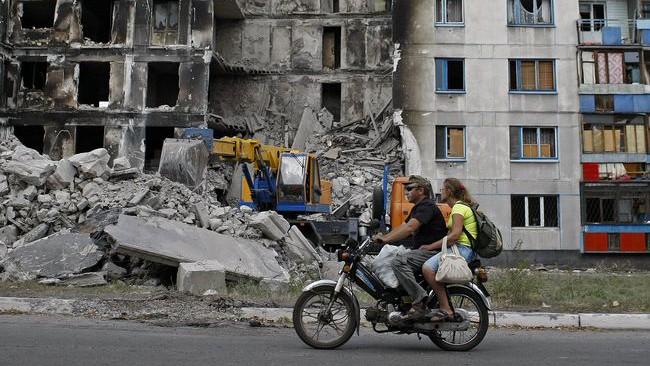The territory was liberated. Were the people as well?
Donbas residents, who had experienced the horrors of war in order to stay loyal to Ukraine, are once again facing a “vicious circle.” The Day offers these stories on how Ukraine can lose its citizens and what should be done about it.
Life under enemy fire, in misery
A group of volunteers spent 10 days in the battle zone and saw why Ukraine is losing her sons and daughters in the east
The residents of the village of Triokhizbenka spent last winter without running water, heating, and gas, under constant enemy fire. There is no telling whether they will have gas because the pipeline is controlled by the militants on this Kremlin-backed-separatist-occupied territory. How the people will keep their homes warm this winter is anyone’s guess. Coal is in short supply on the Ukraine-controlled territories. About half of the 600 village homes, including the daycare center, are damaged by enemy fire. Seventeen children had to be transferred to the local pharmacy. The local school suffered from artillery fire, but one wing has been repaired. The only outpatient clinic is within a radius of 25-30 km and there is one paramedic for 75 localities who visits them riding his scooter. Before the war there were 3,000 residents, now it is less than a thousand, volunteer Kostiantyn Revutsky, Vostok-SOS Public Initiative coordinator, told a news conference with the key “How Ukraine is Losing Citizens in the East” issue on the agenda.
According to Lora Artiuhina, leader of NGO New Donbas, this situation is characteristic of the frontline towns. Last fall, New Donbas volunteers visited border areas in Donetsk oblast. This time 15 volunteers visited Luhansk oblast on a 10-day monitoring tour. They worked with grade schools in three villages: Plotyn, Nyzhnie Teple, and Kindrashivka in Stanytsia Luhanska raion. “The first thing the teachers asked us was to bring chalk for the blackboards. Lots of chalk in Stanytsia Luhanska raion, but people have to dig it up and break it into pieces so their children can write on the desk, which is anything but normal in the year 2015, in a country that has made its European choice,” said Lora Artiuhina, then read out a list of teaching aids the local schools needed, drawn up by teachers, copies of which had been forwarded to the Ministry of Education for ten (sic) years. The list included squares, protractors, maps of the world, spelling Ukrainian, Russian-Ukrainian dictionaries, Ukrainian language tables, microscopes, reagents, checkers, tennis balls, to mention but a few. They wanted to have a Ukrainian memorial room in school but didn’t have the required material and funds. The school in Kindrashivka lacked even cutlery and brooms.
In fact, the local schoolteachers did not expect everything to be provided by the state, although they had the moral right to do just that. The teachers in Plotyn weeded beets for a local farmer and used the money to buy paint for the school floors, so the children could go to school on September 1 and feel comfortable. All this obviously does not help local morale, whereas the Ministry of Culture is demanding patriotic spirit from the institutions of learning. “Our people must realize that they are not a malignant tumor – as some politicians put it – but that they are citizens of Ukraine, just like all of us. Even more so, that they are true Ukrainian patriots who did not abandon their homes and lived through the first year of the war, under almost daily enemy fire. They stayed on their land, in their homes, and they are doing their best to preserve them,” stressed Lora Artiuhina.






